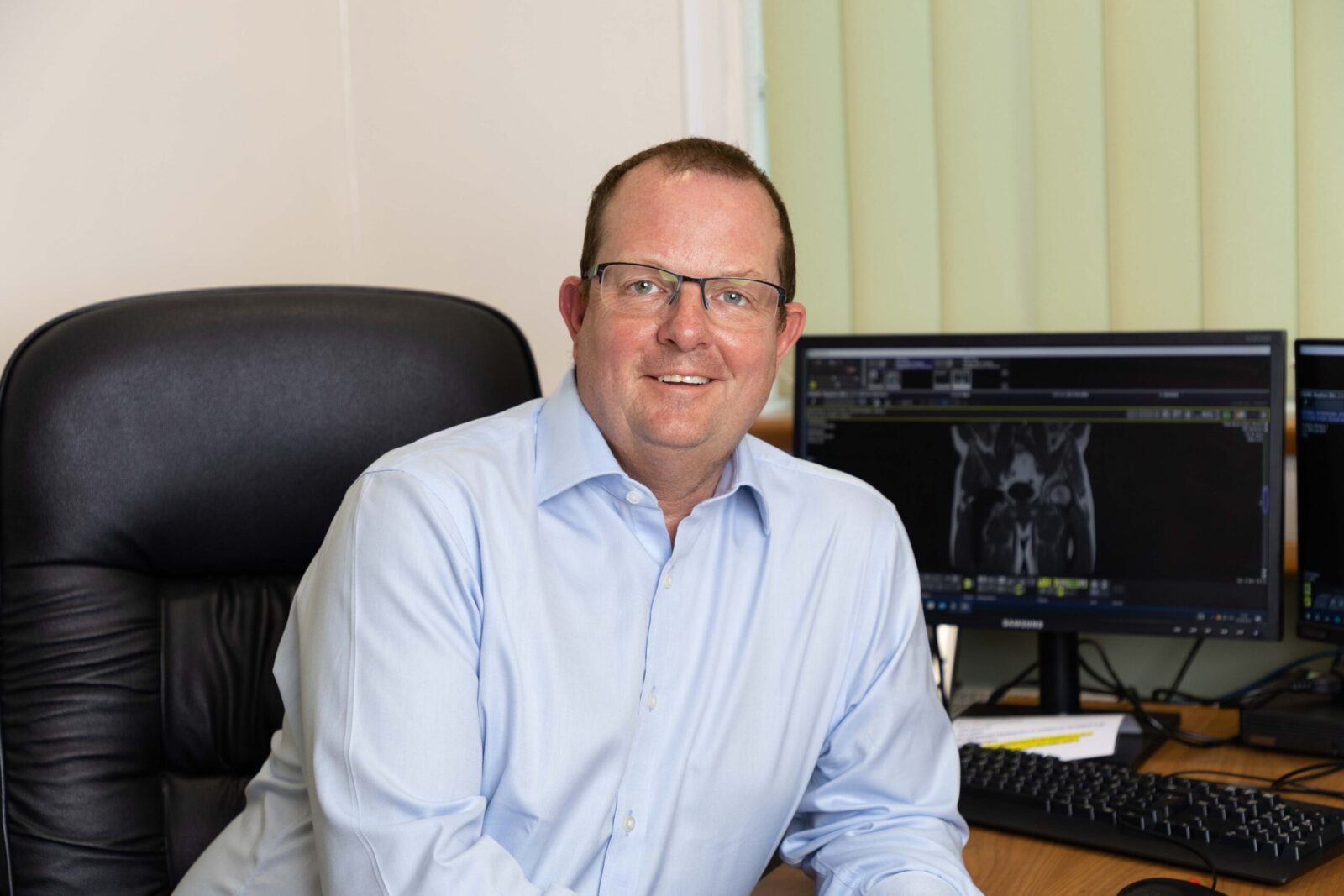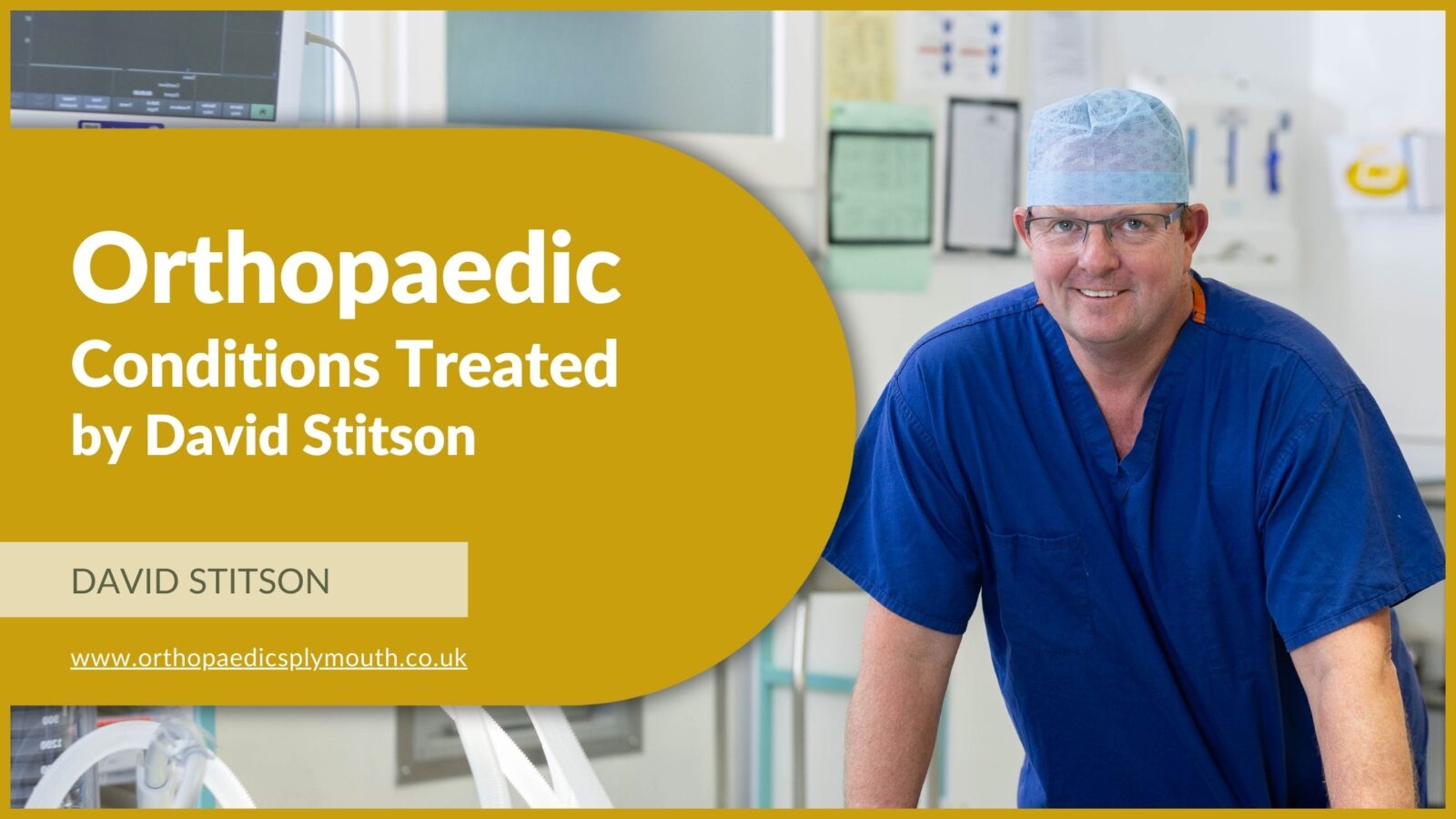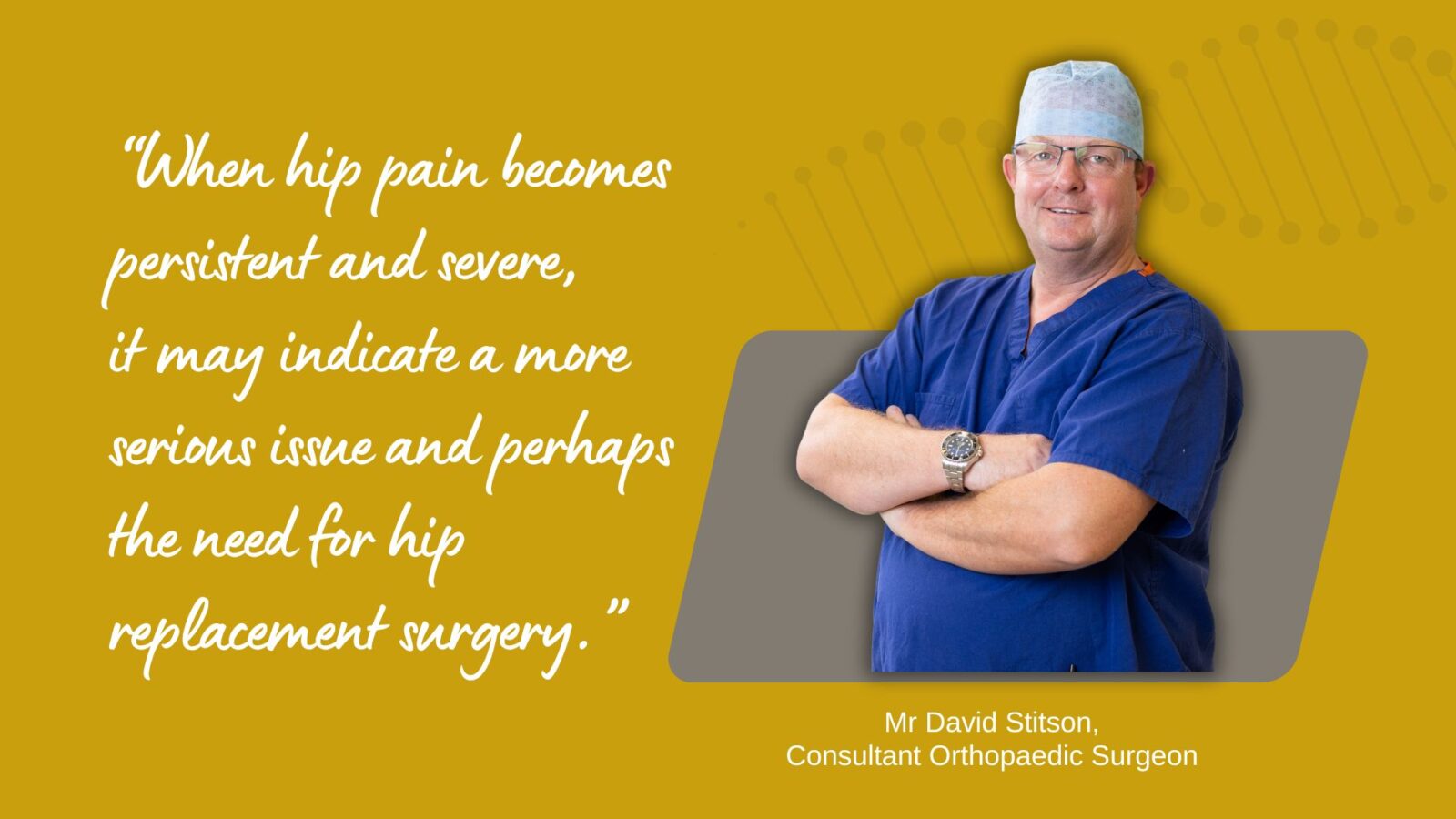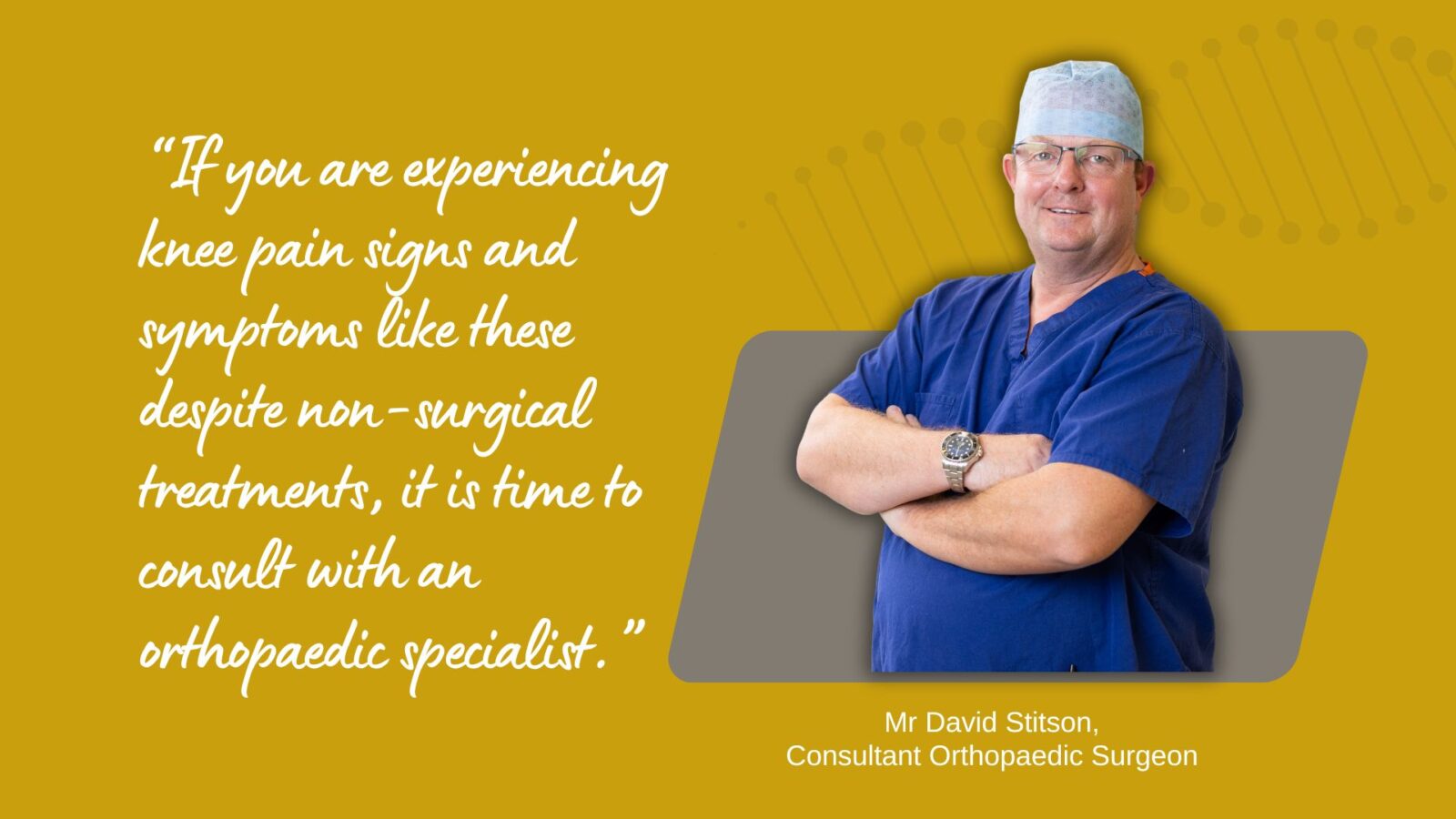Orthopaedic conditions can drastically impact your quality of life, affecting mobility and causing pain or discomfort in daily activities.
David Stitson, a distinguished consultant orthopaedic surgeon based in Plymouth, dedicates his expertise to diagnosing and treating a variety of joint and bone health issues. From common complaints like arthritis to more complex conditions requiring surgical interventions such as knee and hip replacement, his comprehensive orthopaedic care ensures patients receive tailored treatment plans for optimal mobility and recovery.
Contents
ToggleOverview of Orthopaedic Conditions
Orthopaedic conditions encompass a wide range of disorders affecting the musculoskeletal system. These include issues related to bones, joints, ligaments, tendons, and muscles. In this context, expert care provided by professionals like David Stitson is crucial for effective treatment and patient recovery. Below we explore the definition and scope of these conditions, the importance of early diagnosis, and the role of specialised orthopaedic care.
Definition and Scope
Orthopaedic conditions can result from injury, musculoskeletal trauma, degenerative diseases, infections and congenital disorders. These conditions significantly affect an individual’s daily activities and overall quality of life. The field of orthopaedics ranges from minor issues such as sprains and strains to complex problems such as bone fractures and joint replacement.
The scope of orthopaedic treatment is broad and diverse, with professionals addressing conditions such as spinal disorders, musculoskeletal trauma, tumours and developmental deformities. Understanding the vast scope of orthopaedic conditions helps in recognising their impact and the necessity for targeted treatment strategies.
Importance of Early Diagnosis in Orthopaedics
Early diagnosis in orthopaedics is vital for ensuring successful treatment outcomes. Identifying conditions at their onset can greatly limit the progression of disorders and reduce the risk of complications. For instance, timely diagnosis of arthritis can facilitate early intervention, potentially slowing disease progression and preserving joint function.
Patients who seek early medical attention can benefit from less invasive treatments, such as physiotherapy or medication, as opposed to more significant surgical interventions. Early diagnosis helps in managing pain, improving mobility and enhancing overall quality of life. It enables healthcare practitioners to customise treatment plans, ensuring each patient’s unique needs are met effectively.
The Role of Specialised Orthopaedic Care
Specialist orthopaedic care is fundamental in managing complex conditions effectively. Professionals like David Stitson possess the expertise and skills to deliver tailored treatment protocols, including surgical and non-surgical options, depending on the severity and nature of the condition.
The role of specialist care extends beyond medical procedures by incorporating advanced diagnostic tools, personalised rehabilitation programmes and continuous patient education. This comprehensive approach ensures patients receive optimal care, maximising recovery potential. The collaboration with multidisciplinary teams, including physiotherapists and pain management specialists further enhances treatment outcomes.
Common Joint Disorders
Joint disorders are prevalent within the field of orthopaedics, affecting a significant portion of the population. Although common in the elderly such problems can occur at any age. Such disorders often result in pain, stiffness and decreased mobility and sometimes require surgical intervention.
Arthritis (and its variants)
Arthritis is a common orthopaedic condition involving damage to articular cartilage, with varying forms such as osteoarthritis, rheumatoid arthritis and gout. Osteoarthritis, the most prevalent form, is a degenerative joint disease resulting from wear and tear over time. Rheumatoid arthritis, an autoimmune disorder, attacks joint tissues, causing severe inflammation. Gout results from uric acid crystal deposition within joints, leading to sudden and often intense pain.
Effective management of arthritis involves a multimodal approach, including medications, lifestyle modifications, physiotherapy and sometimes surgical procedures such as joint replacement. Understanding the specific type and progression of arthritis is essential for implementing an appropriate treatment plan.
Tendonitis and Bursitis
Tendonitis and bursitis are inflammatory conditions that frequently affect active individuals. Tendonitis involves inflammation of the tendons, often due to overuse or acute injury, causing pain and restricted movement. Bursitis involves inflammation of the bursae, the small fluid-filled sacs that cushion joints, leading to similar symptoms.
Treatment for these conditions focuses on reducing inflammation and pain, often through rest, ice application, anti-inflammatory medications and physiotherapy exercises designed to restore function without exacerbating the condition.
Sports Injuries and Rehabilitation
Sports injuries encompass a range of conditions from strains and sprains to fractures and dislocations. Such injuries require prompt diagnosis and appropriate treatment to prevent long-term damage and ensure rapid recovery. The rehabilitation process is crucial in restoring full function and enabling athletes to return to their activities.
Comprehensive rehabilitation often includes physiotherapy, strength training and sport-specific exercises. Individualised rehabilitation programmes are developed to address the specific needs of the patient, facilitating effective recovery and preventing future injuries. The integration of preventive strategies, such as conditioning exercises and proper technique education, plays a pivotal role in long-term sports health management.
Treatment Approaches by David Stitson
David Stitson employs a multifaceted approach when addressing orthopaedic conditions, centring his methods on both surgical and non-surgical interventions. His philosophy emphasises the restoration of patient mobility and function and the alleviation of pain, thereby enhancing quality of life.
Non-Surgical Interventions
– Physiotherapy: Often recommended as a preliminary line of defence, physiotherapy can strengthen the muscles surrounding the affected joints, increasing flexibility and endurance.
– Medication Management: Utilising medications to control pain and inflammation, particularly in conditions such as arthritis, is integral to maintaining patient comfort and mobility.
– Injections: Sometimes, corticosteroid injections or hyaluronic acid may be suggested to combat inflammation and provide lubrication to joints, aiding in pain relief and movement.
Patient-Centred Care
David Stitson’s patient-centred approach involves personalised treatment plans tailored to the specific needs and health conditions of each patient. Recognising that each individual’s journey to recovery is unique, he collaborates closely with patients to determine the most effective paths for their treatment and control of orthopaedic conditions.
Surgical Treatments Performed by David Stitson
When surgical intervention becomes necessary, David Stitson’s expertise in various surgical treatments ensures that patients receive high-quality care aimed at maximising functional outcomes.
Total Knee Replacement
Knee replacement surgery is one of the most common procedures performed by David Stitson. It involves replacing the damaged or worn parts of the knee joint with artificial components. This surgery is particularly beneficial for patients suffering from severe arthritis or significant joint damage due to injury. The procedure helps alleviate pain and restores functional movement to the knee, enabling patients to return to their daily activities with reduced discomfort.
Partial Knee Replacement
In cases where only part of the knee joint is affected, David Stitson may recommend a partial knee replacement. This surgery targets specific damaged areas of the knee, preserving healthy portions of the joint. The less invasive nature of this procedure often results in quicker recovery times and improved joint flexibility, making it an excellent option for patients who qualify.
Revision Knee Replacement
For patients who experience complications or wear and tear from previous knee replacement, a revision knee replacement may be necessary. This complex procedure involves removing the old prosthetic components and replacing them with new ones. David Stitson’s meticulous approach ensures that stability and alignment are restored, offering patients renewed mobility and comfort.
Knee Arthroscopy
Knee arthroscopy is a minimally invasive surgical technique used by David Stitson to diagnose and treat issues within the knee joint. Using a small camera, the procedure allows for precise treatment of conditions such as torn cartilage or ligaments without the need for large incisions. Patients benefit from reduced pain, minimal scarring and a quicker recovery period, making knee arthroscopy a favourable option for many.
Total Hip Replacement
Hip replacement surgery involves replacing the damaged hip joint with an artificial one. David Stitson specialises in this procedure, which is common for those suffering from chronic hip pain and limited mobility due to arthritis or injury. The operation significantly improves the patient’s ability to move without pain, thereby enhancing overall quality of life.
Revision Hip Replacement
When previous hip replacements fail or cause complications, a revision hip replacement becomes necessary. This surgery, intricate and demanding, is expertly managed by David Stitson to replace or adjust the existing prosthetic components. The procedure inevitably requires meticulous planning and execution to ensure successful outcomes, allowing patients to regain mobility and live a pain-free life.
It is essential to discuss all your options with Mr Stitson, who can guide you through the treatment process and advise on how you can achieve the best possible outcome.
David Stitson’s comprehensive treatment portfolio complements his commitment to providing exemplary orthopaedic care, ensuring that each patient receives personalised and effective solutions to their joint and bone health concerns.
He provides expert care for a range of orthopaedic conditions, ensuring patients in Plymouth and beyond receive comprehensive treatment for their knee or hip joint issues. By specialising in procedures such as knee and hip replacements, he helps individuals regain mobility and improve their quality of life. Whether dealing with complex joint disorders or common orthopaedic ailments, patients can trust in the expertise and personalised care offered by David Stitson. Prioritising patient recovery, he stands as a leading figure in orthopaedic care.
About Knee Surgery
Knee replacement surgery replaces the worn out, painful and stiff knee joint with a new prosthetic joint. This procedure which may be a partial or a total replacement is normally performed under spinal anaesthesia and is usually followed by a night or two in the hospital. Day-case knee replacement surgery may be an appropriate option for you.
About Hip Surgery
Hip replacement surgery replaces the worn-out, painful and stiff hip joint with a new prosthetic joint. This procedure is normally performed under spinal anaesthesia and is commonly followed by a night or two in the hospital. Day-case hip replacement surgery may be an appropriate option for you.

About Mr Stitson
David Stitson is a Plymouth-based Consultant Trauma and Orthopaedic Surgeon. Trained both in the UK and internationally, he has worked in medicine for more than 20 years for the NHS, for the Royal Air Force and in private practice. Mr Stitson operates privately at the Nuffield Health Hospital, Plymouth.

The Nuffield Plymouth CQC Rating
The Nuffield Hospital has a history that spans over half a century and has built a reputation for high standards of care, professionalism and expertise in delivering health services. They aim for continuous quality improvement in everything they do.
Active Quality and Governance programmes are in place at the Nuffield Hospital Plymouth. As part of this, the hospital is inspected by independent healthcare regulators to ensure it meets the fundamental standards of quality and safety as determined by the regulating body (CQC).
In the most recent inspection, Plymouth Nuffield Hospital was rated as ‘Good’ overall, however, the surgical element of the inspection was rated as ‘Outstanding’. The hospital was referred to as:
“Outstanding in effective and caring, and
Good in safe, responsive and well-led.”






